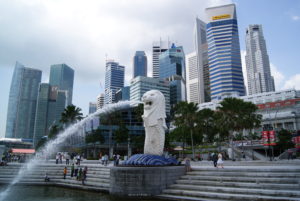Second Singaporean Bank Forced to Close Over 1MDB Scandal
 The Singaporean branch of the Swiss-based Falcon Private Bank closed under orders from the Monetary Authority of Singapore (MAS) under anti-money laundering rules on October 12. The closure was a result of Falcon’s involvement in the Malaysian 1MBD scandal, in which Malaysian Prime Minister Najib Tun Razak was accused of channeling over $3.5 billion in state funds from the 1Malaysia Development Berhad (1MDB) group for private uses. Over $1 billion of the funds were allegedly funneled into personal accounts. MAS also fined Falcon $4.3 million for tax and accounting discrepancies.
The Singaporean branch of the Swiss-based Falcon Private Bank closed under orders from the Monetary Authority of Singapore (MAS) under anti-money laundering rules on October 12. The closure was a result of Falcon’s involvement in the Malaysian 1MBD scandal, in which Malaysian Prime Minister Najib Tun Razak was accused of channeling over $3.5 billion in state funds from the 1Malaysia Development Berhad (1MDB) group for private uses. Over $1 billion of the funds were allegedly funneled into personal accounts. MAS also fined Falcon $4.3 million for tax and accounting discrepancies.
This comes after the MAS shut down another bank associated with the scandal, BSI Singapore, earlier in May. Four senior BSI executives are also being persecuted for various activities related to money laundering, on charges ranging from corrupt transactions to obstruction of justice. UBS and DBS, two of the largest banks operating in Singapore, were also fined over $1 million for breaching anti-money laundering rules, and acting as “conduits” for illegal transactions.
Despite low taxes and regulations playing a role in making Singapore one of the world’s largest and most desirable financial hubs, in recent years the Singaporean government has been cracking down on international money laundering and other types of white-collar crime, investigating over 20,000 suspected incidents in 2013. In the same year, Singapore also cooperated on over 500 cases with other nations. Indeed, Singapore Police Commissioner Ng Joo He said a major goal was to “make Singapore inhospitable to fraudsters, cheaters, scammers and launderers.” At the same time, Singapore’s increasing financial importance on a global scale, having narrowly edged out Hong Kong in a recent ranking, may make regulating a complex and interconnected financial network such as a riskier proposition.
Singapore is not the only country tightening the net around those involved in 1MDB. Switzerland, the home of many of the financial institutions implicated, is also taking action by ordering the seizure from Falcon of $3.5 million of illegal profits and opening criminal proceedings. Meanwhile, US Attorney General Loretta Lynch, who called the 1MDB scandal the “largest kleptocracy case in U.S. history,” has also called on the U.S. justice department to investigate the scandal. Law enforcement agencies in 9 other countries, from the Royal Thai Police to Australian Securities and Investments Commission, have also launched probes into various aspects of the scandal.
This interregional and international approach to law enforcement in the 1MDB case reflects its globalized origins. Falcon is owned by International Petroleum Investment Company, a state-established wealth fund located in Abu Dhabi. Goldman Sachs is under investigation for improperly valuing Falcon’s assets and taking an extraordinarily high commission of nearly $600 million. Meanwhile, PetroSaudi, a Saudi Arabian energy firm, is also under investigation for abetting 1MDB in covering losses. Wealth funds in Luxembourg, a U.S. movie production company associated with The Wolf of Wall Street, and mysterious bank accounts in Hong Kong all reveal the grand scale of 1MDB, itself a microcosm for the financial industry. What remains for the future of the 1MDB scandal internationally is yet to be seen. The increasing persecution of money launderers and other white-collar criminals does help international stability and trust, given the level of cooperation between international law agencies. However, the scale of this particular crime may contain many more layers which are yet to be revealed.
